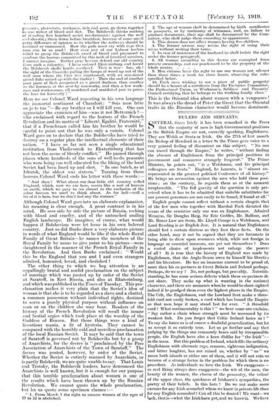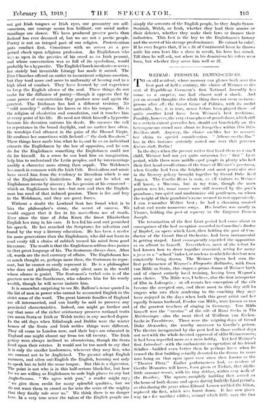RULERS AND SERVANTS.
QEVERAL times lately it has been remarked in the Press kj that the majority of men in high Governmental positions in the British Empire are not, correctly speaking, Englishmen. They are Welsh or Scots or Irish. On the 27th of last month the Bishop of Hereford in a letter fo the Times gave voice to a very general feeling of discontent on this subject. " No ono can travel through the Empire," he writes, "without finding the absence of Englishmen from the principal positions in government and commerce strangely frequent." The Prieto Minister, he points out, " is a Welshman, and his principal colleagues are Scots." England, he laments, is "almost un- represented in the greatest political Conference of all hiatory." He brings no accusation against the men who hold these posi- tions; on the contrary, he regards them as at the moment irreplaceable. " The full gravity of the question is only per- ceived when it has to be admitted that suitable substitutes for our present governors are not easily to be found, if found at all."
English people cannot reflect without a certain chagrin that of the few mon who together with Marshal Foch dictated the terms of the armistice only one was an Englishman. Admiral Wemyse, Sir Douglas Haig, Sir Eric Geddes, Mr. Balfour, and Mr. Bonar Law are Scots, Mr. Lloyd George is a Welshman, and Lord Reading is an English Jew. It is natural that Englishmen should feel a certain distress as they face these facts. On the other hand, may it not be argued that they are fortunate in being able to draw upon resources which, while not foreign in language or essential interests, are yet not themselves ? Does a varied choice of implements not enlarge the powers: of all ? It is true that the history of England was made by Englishmen, that the Anglo-Saxon owes to himself his liberties and his literature. He has an immense amount to be proud of, more than his co.partners in Great Britain and Ireland perhaps. Perhaps, do we say ? No, not perhaps, but provably. Notwith- standing, he list some serious defects which these co-partners dc not share. They make up what is wanting in the national character, and there are moments when ho would be short-sighted indeed if he grudged them even the highest places in the Empire. The Celt, the Englishman, and the Lowland Scot make a three- fold cord not easily broken, a cord which has bound the Empire so that men hope it may stand fast for ever. " A threefold cord ! What sentimentality is this ? " we hear some one exclaim. " Say rather a chain whose strength must be measured by its weakest link. Do you forget that Celtic Ireland hates us ? " To say she hates us is of course a doubtful generalization, but let us accept it as entirely true. Let us go further and say that judging by the things one commonly hears said by irresponsible people, the English have also a keen dislike for "the Irish"— in the mass. But this problem of Ireland, which fills the ordinary Englishman with alternate rage, remorse, righteous indignation, and bitter laughter, has not ruined us, whether by " us " we mean both islands or either one of them, and it will not ruin us because of a strange factor in the problem for which there is no precedent. As individuals we love the Irish. We exaggerate—. as real liking always does exaggerate—the wit of the men, the beauty of the women, the charm of the peasantry, -the valour of the upper class, the quickness of Irishmen's sympathies, the poetry of their beliefs. Is this hate ? Do we not make more excuses for any Irish scoundrel whom we know in private life than for any English scoundrel ? Can all this be denied ? We want—we lack, that is—what the Irish have got, and we knowik We hart not got Irish tongues or Irish eyes, our peasantry are selb conscious, our courage seems leas brilliant, our social under- standings are slower. We have produced greater poets than Ireland has ever dreamed of, but we are not a poetic people. Poetry is not an integral part of our religion. Protestantism puts conduct first. Conscience with us serves as a per- petual check upon religious profession. Au Englishman who wss as open in the practice of his creed as in Irish peasant, and whose conversation was as full of its symbolism, would probably be a hypocrite. The English Church inculcates reserve ; her stately but invariable Liturgy has made it sacred. The Free Churches offered an outlet to incontinent religious emotion, but they tend more and more to uniformity of bearing and to a high ideal of conduct. They have learned by sad experience to keep the English silence of the soul. These things do not make for the diffusion of poetry--though it appears that by some power of concentration they produce now and again the greatest. The Irishman has had a different training. No "cold morality" stiffens his knees or tics his tongue. His is the religion of absolution and consolation, end it touches him at every point of his life. He need not think himself a hypocrite because his devotion outruns his deeds. He answers the call to repentance in the broad daylight, and no matter how often. He worships Cod oftenest in the guise of the Blessed Virgin. He confuses her sometimes with Ireland—" the dark Rosa leen." These things have made hint what he is, and he as an individual attracts the Englishman by the law of opposites, and he can do for the Englishman something the Englishmen could not do for himself. In a sense ho can lend him en imegination, help him to understand the Latin peoples, and by intermarriage modify a character more strong than supple. The Welshman has much in common with the Irish Celt. Revivalism and music have saved him from tho tendency to literalism which is one of the Englishman's limitations. Ho may not be what an Englishman means by sincere ; he lies passion at his command— Which an Englishman has not—but now and then the English- man has need of that induced passion. There is fire and fury in the Welshman, and they are great forces.
Without a doubt the Lowland Scot has found what is to him the philosopher's stone, the secret of SUCCORS. We would suggest that it lies in his marvellous use of words. Ever since the time of John Knox the fineat Elizabethan English has rung in his ears. It has fed his soul and garnished his speech. He has searched the Scriptures for salvation and found by the way a literary education. He has been a reader for more generations than the Englishman, who did not team to read easily till a choice of rubbish turned his mind from good literature. The result is that the Englishmen seldom does justice to that great language of his. The Scotsman always does. After all, words aro the real currency of affairs. The Englishman has as much thought as, perhaps more then, the Scotsman to repre- sent, but he cannot so easily represent it. He is a philosopher who does not philosophize, the only silent man in the world whose silence is genial. The Scotsman's verbal coils is of the greatest use to the Southerner, who admires him for his wordy wealth. though he will never imitate him.
It is somewhat surprising to see Mr. Balfour's name quoted in the list of men in power who cannot be accounted English in the strict sense of the word. The great historic families of England are all intermarried, and can hardly be said to preserve any provincial characteristics. Indeed, one might go further and say that none of the richer aristocracy preserve national traits (we mean Scots or Irish or Welsh traits) in any marked degree In the old days when Edinburgh and Dublin svero the winter homes of the Scots and Irish nobles things were different. They all come to London now, and their boys aro educated in England one might almost say from ten till twenty. The Irish gentry were always inclined to absenteeism, though the Scots lived upon their estates. It would not be too much to say that it is only the smaller landowners, wherever they may live, who are content not to be Anglicized. The greater adopt English manners, and often out-English the English, learning not only to speak but to hold the same tongue. But this is a digression. The point is not who is in this half-serious black-list, but how far wo are willing as Englishmen to cede high places to any but Anglo-Saxons. " We agree with you," a reader might say; " we give them credit for many splendid qualities, but We do not want them to crowd so far into the scats of the mighty that they finally rule over us." We think there is no danger here. In a very true sense the tulers of the English people are
simply the servants of the English people, be they Anglo-Saxon Scottish, Welsh, or Irish, whether they lead their armies or their debates, whether they snake their laws or finance their industries. This fact is the key to the Englishmates history and the secret of Isis strange predominance. Ho cannot be ruled. If he ever forgets that, if in a fit of Continental fever he throws aside his own laws like a slave in revolt, his hour has struck Till then he will ask, not where in his dominions his rulers were bons, but whether they serve him well or ill.



































 Previous page
Previous page